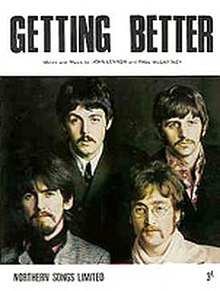Getting Better
| "Getting Better" | |
|---|---|

Original UK sheet music for the song
|
|
| Song by the Beatles from the album Sgt. Pepper's Lonely Hearts Club Band | |
| Released | 1 June 1967 |
| Recorded | 9 March 1967 |
| Genre | |
| Length | 2:47 |
| Label | Parlophone, Capitol, EMI |
| Writer(s) | Lennon–McCartney |
| Producer(s) | George Martin |
"Getting Better" is a song written mainly by Paul McCartney, with lyrical contributions from John Lennon (credited to Lennon–McCartney). It was recorded by the Beatles for the 1967 album Sgt. Pepper's Lonely Hearts Club Band.
The song, which has been said to be musically reminiscent of the hit single "Penny Lane," moves forward by way of regular chords, produced by Lennon's guitar, McCartney's electric piano, and George Martin, who struck the strings of a pianet with a mallet. These heavily accented and repetitive lines cause the song to sound as if it is based on a drone. Lead guitarist George Harrison adds an Indian tambura part to the final verse, which further accentuates this impact.
McCartney's bassline, in counterpoint to this droning, was described by music critic Ian MacDonald as "dreamy" and "well thought out as a part of the production by McCartney". It was recorded after the main track was completed like many of the basslines on Sgt Pepper's Lonely Hearts Club Band were. Starting out in the verse with a pedal on the root note (G) that leaps two octaves, McCartney moves to a marching quarter-note (walking) bass line for the first (and only the first) chorus. In stark contrast, all subsequent choruses are played using a fluid, swing feel, full of anticipated notes that propel the song forward despite the quarter-note droning of the guitar and keyboard.
The song's title and music suggest optimism, but some of the song's lyrics have a more negative tone. In this sense, it reflects the contrasting personas of the two songwriters. In response to McCartney's line, "It's getting better all the time", Lennon replies, "Can't get no worse!" In a December 1983 interview, McCartney praised this contribution as an example of things he "couldn't ever have done [him]self".
...
Wikipedia
